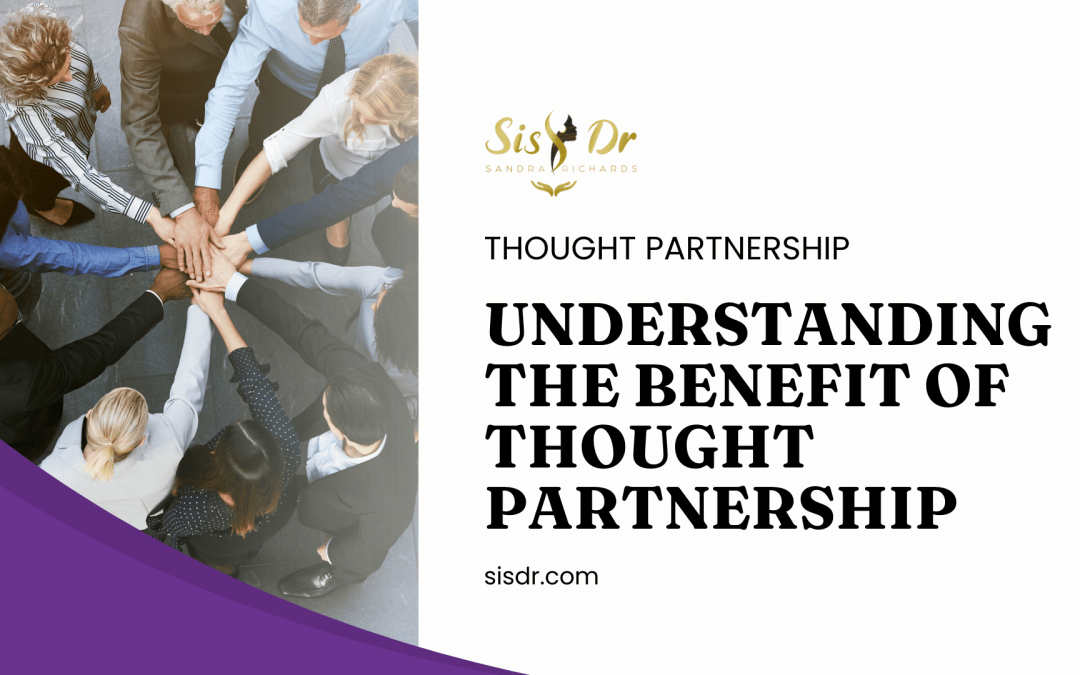Many Black and culturally diverse leaders carry a double workload: leading with vision while managing how they are perceived. What looks like composure may in fact be vigilance. What looks like silence may be the weight of exhaustion. This is not personal failing, but the cost of navigating Eurocentric frameworks that too often misinterpret directness as aggression or honesty as disruption.
The energy consumed in self-editing does not disappear—it is diverted. What could fuel clarity, strategy, and innovation is absorbed by vigilance. What may look like composure is often hyper-awareness, and what may look like silence is often exhaustion.
What is Thought Partnership?
Thought partnership is the practice of thinking in dialogue with another person—not to instruct, evaluate, or prescribe, but to explore, question, and analyse together. It is grounded in intellectual equality. Both partners bring knowledge shaped by culture, power, and lived experience
Unlike mentoring, which assumes a one-way transfer of expertise, thought partnership begins with the recognition that both hold insight worth testing. Its value lies in surfacing assumptions, interrogating blind spots, and examining the frameworks that govern decisions.
Progress is not judged by output alone, but by whether thinking remains aligned with values, integrity, and truth. In practice, thought partnership creates space where:
-
Ideas can be tested without fear of judgment or penalty.
-
Blind spots are revealed without dismissing cultural or personal safety and identity.
-
Analysis unfolds through dialogue rather than being reduced to soundbites.
-
Reflection is recognised as action, not mistaken for inaction.
At its core, thought partnership resists shallow, transactional models of leadership and development. It restores thinking as a shared, rigorous practice—one that honours the whole person.
Why Do Leaders Require It?
Research and lived experience show that many leaders carry unspoken pressures: code-switching, hyper-vigilance, and the suppression of cultural expression. Over time, these demands quietly erode their confidence and presence, leading them to believe that only fragments of themselves are welcome at the table.
Thought partnership interrupts that erosion. It offers a rare space to:
-
Analyse problems without self-censorship.
-
Connect organisational challenges to wider cultural and systemic realities.
-
Reclaim a voice too often disciplined into silence.
-
Align decisions with both professional responsibility and cultural integrity.
It is not indulgence. It is a condition for leadership that is sustainable, authentic, and whole.
Organisational Responsibility
Leadership never exists in a vacuum. It is shaped every day by history, culture, and inequity. When organisations fail to account for this context, particularly the dominance of Eurocentric norms, they limit not just the capacity of individual leaders, but their own potential for growth.
Providing thought partnership is not an afterthought. It is not charity. It is structural.
Organisations that invest in this practice do more than support diverse leaders; they strengthen their own integrity, honesty, and vision. Thought partnership enables organisations to move beyond managing diversity as an initiative, and toward embedding equity as a living, daily practice.
About SisDr
This article draws on SisDr’s work as a coach, psychotherapist, and thought partner to leaders navigating complexity in professional and cultural contexts. Her practice creates space for Black and culturally diverse professionals to lead without the weight of silence.

